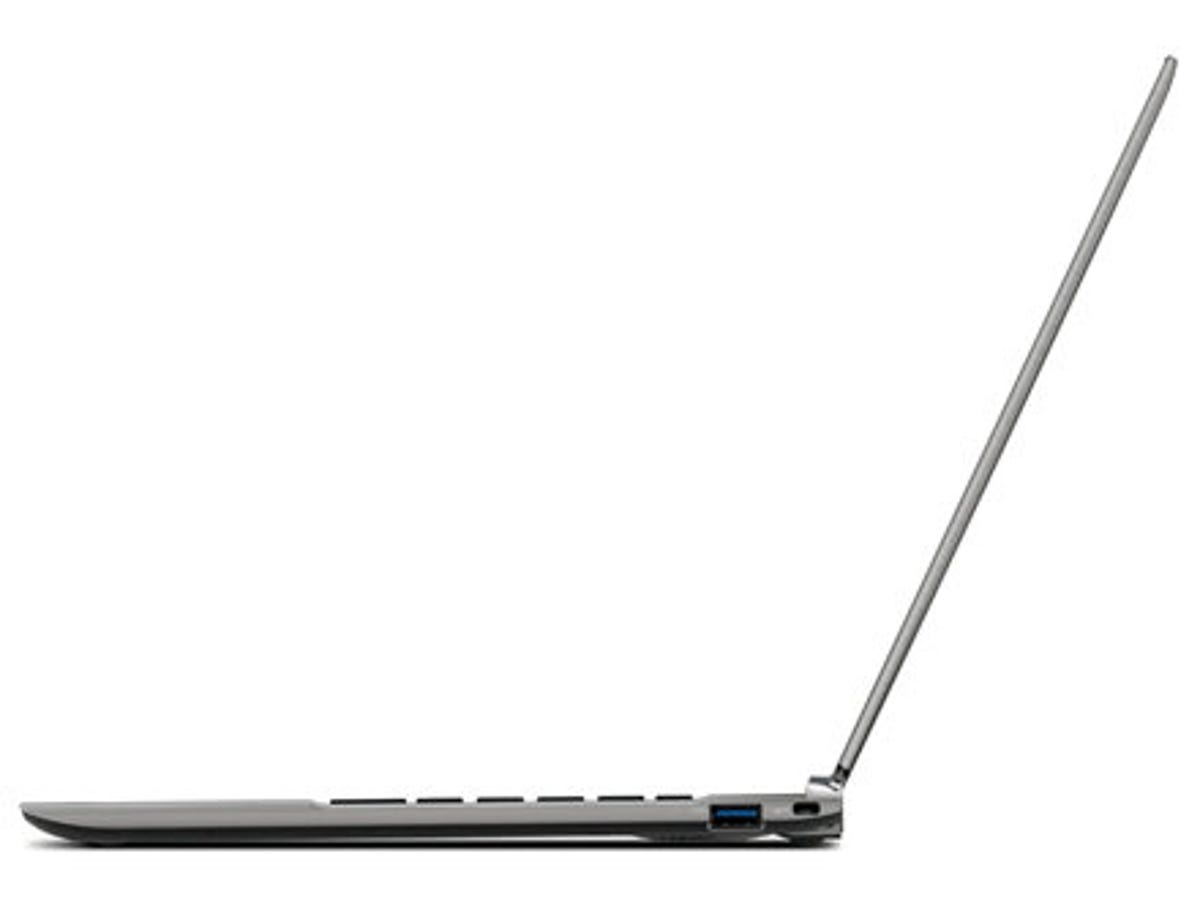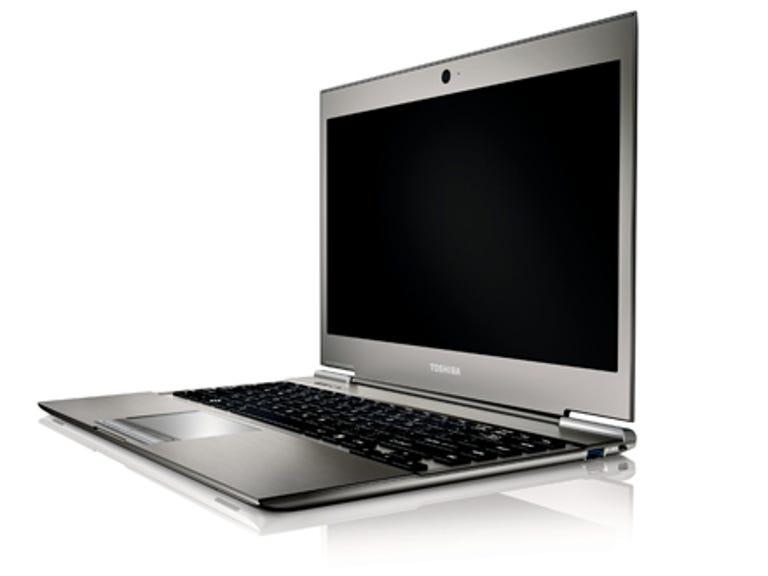 Why You Can Trust CNET
Why You Can Trust CNET Toshiba Satellite Z830 review: Toshiba Satellite Z830
The Toshiba Satellite Z830 is slim and light, but it fails to beat its ultrabook competitors in power, build quality and battery life.
Ultrabook city is booming, with every computer manufacturer arriving in town on the back of an Intel-powered cart, hoping to strike a rich vein of laptop gold.
The Good
The Bad
The Bottom Line
Never one to be left out of a goldrush, Toshiba has thrown together the Z830 -- a slim and very light laptop with a more understated look that would suit the travelling prospector professional. But will it offer enough to take the shine off the glittering gem that is Asus Zenbook UX31?
Our model came with an Intel Core i5 processor and 6GB of RAM. It's available now for £1,000.
Design and build quality
The Z830 is instantly recognisable as part of the ultrabook gang due to its extremely svelte physique. At a mere 8.3mm at the front, it's certainly a very slim machine and at 17mm at the rear, it's one of the slimmest laptops available.

This tiny size means you can do away with carrying a bulky laptop bag around with you, as it will easily slide into the most slender of messenger-style bags, nestling comfortably against your notepads without causing any embarrassing bulges.
With a weight of only 1.1kg, it's very light too, undercutting the weight of the Asus UX31 by 200g and making the Z830 a light traveller's dream. The weight reduction has mostly been made in the chassis -- Toshiba has constructed the Z830 from magnesium, rather than the aluminium used on the UX31.
Sadly, that has resulted in the build quality of the Z830 seeming somewhat less than perfect. The lid is extremely thin, offering a frightening amount of flex -- something that isn't present at all in the aluminium UX31. There's flex in the keyboard tray too, making the whole machine feel much less sturdy than we'd like.
Toshiba has obviously settled on a trade-off between weight and build materials, and it's done an admirable job in reducing the weight, but we'd definitely like it to be firmed up in places.
The keyboard is made up of square, isolated keys that are spaced well across the chassis resulting in a comfortable typing experience. We were able to type for long periods without feeling the tell-tale aches we'd experience on less comfortable keyboards. If you're planning on bashing out some long documents for work, rest assured it won't be the keyboard that slows you down.
The trackpad is very responsive, which makes for a swift web-browsing experience, but it's pretty small -- considerably smaller than the clickable trackpads found on the UX31 or the 13-inch Apple MacBook Air. The two buttons are easy to click and if you really need more freedom in your scrolling, you can just hook up a USB mouse.
On the looks front, the Z830 doesn't have the same sleek, stylish appeal of the UX31 or the Air, but it's still pretty smart. It's perhaps more appropriate in a professional, business environment than its flashier ultrabook brethren.
Screen
Unlike the Zenbooks and the Air, the Z830 is only available with a 13.3-inch screen, so if you're after an 11-inch model to whisk away on your travels, you're out of luck. 11-inch machines are less of a necessity in the professional realm, as long documents and spreadsheets are easier to edit with a larger screen, so it's understandable Toshiba hasn't opted for a smaller size.
What's less forgivable though is the relatively poor resolution on offer. The Z830's 13.3-inch display has a resolution of 1,366x768 pixels -- fairly standard for a laptop of this size, but both the UX31 and 13-inch MacBook Air offer 1,600x900-pixel screens. It's a shame Toshiba hasn't tried to keep in step with the competition.
Tosh has given it a matte coating though, which significantly reduces reflections, making it great for use under bright lights or direct sunlight. It does mean, however, that the screen lacks the punchy colours and depth of glossy displays, resulting in pictures that often look quite washed out. If you want to catch up on some Hannah Montana while you're away, the Z830 isn't going to do them much justice. Shame.
It may not be your best friend for movies, but it's still bright and sharp so getting on with your office work won't be a problem.
Performance
Lurking inside that slim body you'll find an Intel Core i5-2467M processor clocked at 1.6GHz, paired up with a healthy 6GB of RAM.
If you don't need quite so much power and want to save yourself £150, you can opt for the Core i3 version. But if you're a power user and want some more junk in the trunk, you might be disappointed to find there's no Core i7 version.
That's quite a shame, as the Asus UX31 comes with a Core i7 processor and costs the same as this Toshiba. The Z830 has slightly more RAM though, so we're hoping it can at least match the UX31 in the power stakes.
To find out, we booted up PCMark05 to put the processor through its paces. The Z830 returned an admirable score of 8,328, which we were pretty impressed with. But it didn't come close to the 11,650 the UX31 achieved on the same test, so you're getting much better value in terms of raw processing power from the Asus.
That 6GB of RAM makes the Z830 an excellent multi-tasker though. We fired up our web browsers and set a whole load of tabs streaming video while simultaneously playing high-definition video in both VLC Media Player and Windows Media Player. We didn't detect any slowdown. Once you start to fill it up with your own programs and scatter files everywhere it'll start to flag, but it's off to an excellent start.
It managed to encode our 11-minute 1080p video into 24fps H.264 in just under 23 minutes, which isn't particularly speedy, but isn't terrible either. It'll handle some light photo and video editing, but if you're trying to edit high-resolution raw image files or render 1080p video laden with effects, you can expect it to start crying little mechanical tears.
There's no dedicated graphics card in the Z830, but for a machine that's designed to be super-slim and portable, that's hardly a surprise. Even so, we loaded up Dirt 3 and took our car for a spin to see just what it can handle.
When we ran it at the full 1,366x768-pixel resolution with shadow and detail, it was able to achieve around 14 frames per second. That's nowhere near a playable rate for such a fast-paced game, so we knocked the resolution down to 1,280x720 pixels, set the shadows to low and achieved around 19fps, which made the gameplay much smoother, although not quite as silky as we saw on the UX31.
We were generally impressed with the performance of the Z830, but it's sadly overshadowed by the more powerful Asus Zenbook UX31. In order to properly compete, the Z830 needs to be either cheaper than the UX31 or more powerful. As it stands, it's neither.
Battery performance
If you're always working on the go, you'll need a machine that can last a decent amount of time away from a plug socket. We were hoping for a strong performance here as the 128GB solid-state drive in the Z830 helps to extend the battery life -- SSDs have no moving parts and are therefore more economical than traditional hard disk drives.
When we ran our battery benchmark test, the Z830 managed to keep going for 2 hours 11 minutes before waving its little white flag and conking out. It's a very demanding test, so you'll get a much better score with cautious usage, but it still managed a full hour less than the UX31.
Conclusion
The Toshiba Satellite Z830 earns points for its slim and exceedingly lightweight design. It may not look as fancy as other models, but it will certainly suit a professional looking for a portable business machine.
Sadly, when pitted against its chief ultrabook competitor, the Asus Zenbook UX31, it loses out in build quality, screen resolution, power and battery life. As both models cost the same, we recommend you opt for the Asus.


